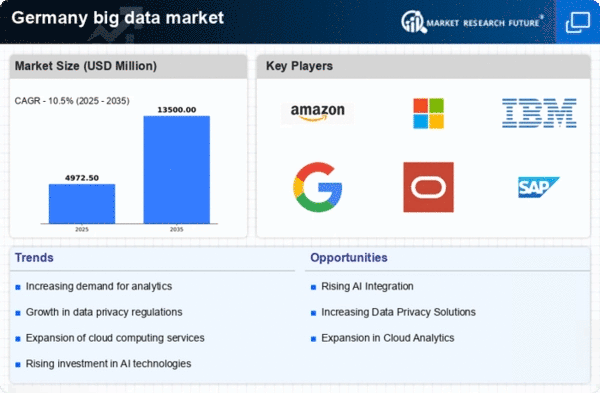Increased Focus on Data Security
As the volume of data generated continues to rise, the emphasis on data security within the big data market is becoming increasingly pronounced. Organizations in Germany are prioritizing the implementation of robust security measures to protect sensitive information from breaches and cyber threats. This heightened focus is driven by regulatory requirements and the need to maintain consumer trust. In 2025, it is projected that spending on data security solutions will account for approximately 15% of total IT budgets among enterprises. This trend indicates a growing recognition of the importance of safeguarding data assets, which is essential for the sustainable growth of the big data market. Consequently, companies are investing in advanced security technologies, such as encryption and access controls, to mitigate risks and ensure compliance with data protection regulations.
Rising Demand for Data Analytics
The increasing reliance on data-driven decision-making is propelling the big data market in Germany. Organizations across various sectors are recognizing the value of data analytics to enhance operational efficiency and customer engagement. According to recent estimates, the data analytics segment is projected to grow at a CAGR of approximately 25% through 2026. This surge is attributed to the need for actionable insights that can drive strategic initiatives. As businesses strive to remain competitive, the demand for advanced analytics tools and platforms is likely to escalate, thereby fostering growth in the big data market. Furthermore, the integration of analytics into everyday business processes is becoming commonplace, indicating a shift towards a more data-centric culture within organizations. This trend is expected to continue, further solidifying the importance of data analytics in the big data market.
Emergence of Data-Driven Startups
The entrepreneurial landscape in Germany is witnessing a surge in data-driven startups. These startups are significantly influencing the big data market. These startups are leveraging advanced technologies to develop innovative solutions that address specific industry challenges. The rise of such companies is indicative of a broader trend towards digital transformation across various sectors. In 2025, it is estimated that The number of data-centric startups is expected to increase by 30%, reflecting the growing recognition of data as a critical asset. This influx of startups not only fosters competition but also drives innovation, as they introduce new methodologies and technologies to the market. As these companies continue to emerge, they are likely to contribute to the overall growth and evolution of the big data market in Germany.
Government Initiatives and Support
The German government is actively promoting the adoption of big data technologies through various initiatives and funding programs. These efforts aim to enhance the country's digital infrastructure and encourage innovation in the big data market. For instance, the Digital Strategy 2025 outlines plans to invest billions in digital transformation, which includes support for big data projects. Such government backing not only provides financial resources but also fosters collaboration between public and private sectors. This collaborative environment is likely to stimulate advancements in big data technologies and applications, making them more accessible to businesses of all sizes. As a result, the big data market is expected to benefit from increased investment and innovation, positioning Germany as a leader in the European data landscape.
Growth of IoT and Connected Devices
The proliferation of Internet of Things (IoT) devices is significantly impacting the big data market in Germany. With millions of devices generating vast amounts of data, organizations are increasingly seeking solutions to manage and analyze this information effectively. The IoT market in Germany is anticipated to reach €100 billion by 2025, which will inevitably contribute to the growth of the big data market. As companies harness the power of IoT data, they can gain valuable insights into consumer behavior, operational efficiency, and product performance. This trend underscores the necessity for robust data management and analytics solutions, which are essential for extracting meaningful insights from the data generated by connected devices. Consequently, the integration of IoT with big data technologies is likely to drive innovation and growth within the market.
















